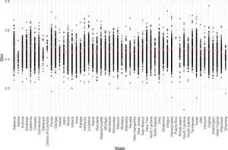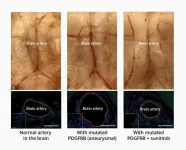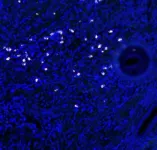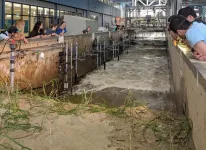(Press-News.org) Rich individuals living in communities with greater levels of economic inequality tend to be more generous with charitable giving and prosocial behaviors, according to a study published June 14, 2023 in the open-access journal PLOS ONE by Joel H. Suss from the London School of Economics & Political Science and Bank of England, UK.
Many studies have attempted to assess whether the rich are more or less generous than the poor, and whether this shifts depending on the starkness of economic inequality. Thus far, the results have been inconclusive. Previous work in this vein has been conducted at a macro level, using state, region, and country-level aggregated data. In this study, Suss examined whether more specific economic data at the local, neighborhood level might provide greater insight into the relationship between generosity and income.
Suss analyzed information on charitable donations in 2018 from the US Internal Revenue Service, as well as 2014-2018 data on income inequality from the American Community Survey, using zip code areas (mean population 14,041; standard deviation 15,846) as the most granular community unit. He also analyzed data on self-reported charitable giving and volunteering from the 2016-2018 UK survey “Understanding Society” (N= 39,289), comparing these with housing values to approximately measure neighborhood inequality.
In contrast to previous studies, Suss found local inequality increased the generosity of richer groups in both the UK and US when viewed with this more specific local lens. In the US analysis, more unequal areas also showed less generosity from the lowest-income groups. In follow-up analyses aggregating his US data more broadly at the county and state levels, in line with the methods of previous research, Suss’ results reversed, showing increased inequality reducing giving by all income groups relative to the lowest income group (incomes less than $10k)—and underscoring the importance of the chosen spatial unit.
These results show correlation of income and prosocial behavior in the context of economic inequality but cannot explain causation. Suss points to future analyses assessing whether this more granular approach generalizes to cultures beyond the US and UK. He also encourages further investigation into the seemingly contradictory result of macro-and micro-levels of inequality showing opposite effects on generosity and income, suggesting that this may be due to increased economic segregation across communities.
The authors add: “Inequality is experienced locally, within peoples’ neighborhoods and communities. The implications of this for how people behave toward others has been largely overlooked in the academic literature, which most often considers inequality from a macro perspective. This paper examines the relationship between local inequality and charitable giving—an important form of pro-social behavior—in large US and UK samples. The results indicate that local inequality is associated with increased generosity amongst rich people in both places, which is contrary to findings at more aggregated geographical levels, pointing to contrasting implications of inequality at different spatial levels.”
#####
In your coverage please use this URL to provide access to the freely available article in PLOS ONE: https://journals.plos.org/plosone/article?id=10.1371/journal.pone.0286273
Citation: Suss JH (2023) Higher income individuals are more generous when local economic inequality is high. PLoS ONE 18(6): e0286273. https://doi.org/10.1371/journal.pone.0286273
Author Countries: UK
Funding: The author received no specific funding for this work.
END
When local economic inequality is high, the rich tend to be more generous
2023-06-14
ELSE PRESS RELEASES FROM THIS DATE:
Ocean current comes to the rescue for Pacific island reefs
2023-06-14
Marine heatwaves are emerging as a key impact of climate change and pose a particularly significant threat to corals that form the backbone of coral reefs. Researchers have now identified a phenomenon that could help coral reef managers better plan and act for the future.[1]
Every few years, the cyclic climate pattern called El Niño arises in the tropical Pacific, causing significant changes in winds, weather and ocean temperatures. From April 2015 to May 2016, the Central Pacific witnessed one of the strongest El Niño events ever recorded.
Coral reefs were so stressed by the warmer ocean temperatures that they experienced mass bleaching, whereby the ...
'Smart' drugs can decrease productivity in people who don't have ADHD, study finds
2023-06-14
New research from the University of Cambridge and the University of Melbourne, published in Science Advances, shows neurotypical workers and students taking cognitive enhancers, or ‘smart’ drugs, may actually be inhibiting their performance and productivity.
Drugs such as methylphenidate, sold under the brand name Ritalin among others, are commonly prescribed for attention deficit hyperactivity disorder (ADHD), but are also taken by those without a diagnosis, in the belief that the drugs will enhance focus and cognitive performance.
In four double-blinded, ...
The mutant origin of brain aneurysms and the first drug treatment
2023-06-14
Researchers at the RIKEN Center for Brain Science (CBS) in Japan have discovered a set of related mutations that lead to intracranial aneurysms—weakened blood vessels in the brain that can burst at any time. The mutations all appear to act on the same biological signaling pathway, and the researchers report the first ever pharmaceutical treatment in a mouse model, which works by blocking this signal. The study was published in Science Translational Medicine on June 14.
About 5% of the population have unruptured intracranial aneurysms in blood vessels on the surface of the brain. Despite being ballooned arteries with ...
Massive hemorrhages are often deadly. Can a perfume ingredient stop the bleed and save lives?
2023-06-14
The chances of surviving massive blood loss from a traumatic injury such as a gunshot wound are around 50 percent. To survive, a patient needs two things to happen quickly: a large infusion of blood and coagulation at the wound to stop the bleeding.
The problem is one of these solutions prevents the other. Introducing a large amount of blood to those suffering a massive hemorrhage impairs the blood’s ability to clot, a condition known as coagulopathy.
Now, Tulane University researchers have uncovered the cause of coagulopathy in trauma victims receiving a blood infusion. They also found that a synthetic compound ...
Altered gut bacteria may be early sign of Alzheimer’s disease
2023-06-14
People in the earliest stage of Alzheimer’s disease — after brain changes have begun but before cognitive symptoms become apparent — harbor an assortment of bacteria in their intestines that differs from the gut bacteria of healthy people, according to a study by researchers at Washington University School of Medicine in St. Louis.
The findings, published June 14 in Science Translational Medicine, open up the possibility of analyzing the gut bacterial community to identify people at higher risk of developing dementia, and of designing microbiome-altering preventive treatments to stave off cognitive decline.
“We don’t yet know ...
Elimination of type of bacteria suggests treatment for endometriosis
2023-06-14
A research group from the Graduate School of Medicine and iGCORE at Nagoya University in Japan, has discovered that using an antibiotic to target Fusobacterium reduced the formation of lesions associated with endometriosis, a gynecological disorder characterized by endometrial tissue usually found inside the uterus being found outside it. Their findings suggest an alternative treatment for this disorder. The study was published in Science Translational Medicine.
Endometriosis affects one in ten women between the ages of 15 and 49. The disorder can cause lifelong health problems, including pelvic pain and infertility. ...
Newly planted vegetation accelerates dune erosion during extreme storms, research shows
2023-06-14
CORVALLIS, Ore. – Newly planted vegetation on coastal sand dunes can accelerate erosion from extreme waves, a study involving researchers from the Oregon State University College of Engineering suggests.
The authors note the findings run counter to the widely accepted paradigm that vegetation always acts to reduce erosion on dunes, the first line of storm defense for landscapes that are among the world’s most ecologically important and economically valuable.
The experiments involved building beach dune profiles 70 meters long and 4.5 meters high and subjecting ...
Preserving forests to protect deep soil from warming
2023-06-14
A recent study led by scientists at Lawrence Berkeley National Laboratory (Berkeley Lab) and the University of Zurich has revealed that the organic compounds proposed for carbon sequestration in deep soil are highly vulnerable to decomposition under global warming.
The finding has implications for a key strategy in carbon management that relies on soil and forests – natural carbon “sinks” – to mitigate global warming.
About 25 percent of global carbon emissions are captured by forests, grasslands, and rangelands. During photosynthesis, plants store carbon in their cell walls and in the soil. Because ...
Treatment creates steel alloys with superior strength and plasticity
2023-06-14
WEST LAFAYETTE, Ind. — A new treatment tested on a high-quality steel alloy produces extraordinary strength and plasticity, two traits that must typically be balanced rather than combined. Ultra-fine metal grains that the treatment produced in the outermost layer of steel appear to stretch, rotate and then elongate under strain, conferring super-plasticity in a way that Purdue University researchers cannot fully explain.
The researchers treated T-91, a modified steel alloy that is used in nuclear and petrochemical ...
TCT 2023 Program Guide now available
2023-06-14
NEW YORK – June 14, 2023 – The Cardiovascular Research Foundation (CRF) has announced the TCT 2023 Program Guide is now available. TCT is the annual scientific symposium of CRF and the world’s premier educational meeting specializing in interventional cardiovascular medicine. TCT 2023 will take place October 23-26 in San Francisco, California, at the Moscone Center and will celebrate 35 years of leading the field.
Every year, TCT features major medical research breakthroughs and gathers ...







